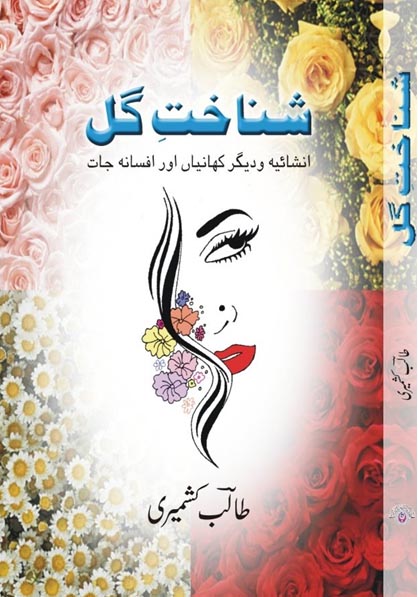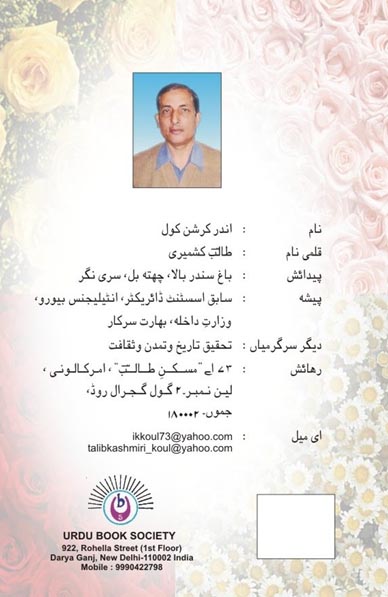Book Reviews
‘Shanakht-e-Gul’ (Urdu short story collection) by Talib Kashmiri (original
name Inder Krishen Koul), published by Urdu Book Society, Darya Ganj New
Delhi. Pages 176)
(Koshur Samachar, New Delhi , Nov. 2009)
Talib Kashmiri has been writing short stories in Urdu and English for
quite some time which appear in various national and state level
magazines, newspapers etc. However, his short story collection in Urdu
in the form of a book titled “ Shanakht-e-Gul ” (Literal
meaning….Identity of a Flower) has come in market for the first time.

The Book comprises 21 stories(Including 4 of humor and satire) and 1
composition (known as Inshaiya in Urdu). The stories mostly relate to
the travails and turbulences encountered by a common man in day to day
life, be these emerging from his poverty, deprivation, exploitation by
the strong for their vested interests or such evils in social and public
life as communal hatred, religious bigotry, terrorism, corruption and
misuse of power, blind belief in superstitions etc. The stories like
Deewar, Qasoorwar, Khota Sikka, Aag, Kismat and Wheel Chair indicate
writer’s tremendous potential to delve deep into the human psyche and
other factors determining his relationships of love, affection,
acceptance, sacrifice, abhorrence, animosity and the like, and a
forceful pen to weave various kinds of happenings into an impressive
plot of the story. When it comes to espousing the cause of the
downtrodden, Talib emerges as a relentless crusader against those who
take the poor for granted and uses his pen stronger than ever before to
expose the nefarious designs of the powerful exploiters as amply
demonstrated in his stories like Mukti, Chori, Taaqatwar, Aasoodgi and
Aag. He is also deadly against using man-made social inequalities and
economic disparities as an excuse to suppress the genuine aspirations
generating from the divine sentiments of love, humanity, compassion and
sympathy. Even the stories of humor and satire contain a strong but
subtle message to its readers that good conduct is the basic essence of
happy living. The book is written in a simple language and the author
has avoided using bombastic expressions for the benefit of those who
possess even the fundamental knowledge of Urdu and considered together
with the preface and the introduction written by the two highly
acclaimed authorities in Urdu viz. Sham Sunder Anand Lehar, Novelist cum
short story writer and Prof. Zahoor-ul-Din, former Head of the Deptt
Urdu, Jammu University, it can make a nice reading.
(Khalid Hussain)
‘SHANAKHT-E-GUL’
Mirroring harsh realities, dilemmas in life
(Kashmir Times, Jammu dt. Sep.12 and Sgr. dt.Oct 7, 2009)
Enrichment of Urdu language through different kinds of
creative works like novel, short story, poetry etc.
etc. has been a process going on for centuries and the
Language particularly the field of novel and short
story writing the later one popularly known as Afsaana
Naweesi / Kahani Kari can boast of having been
nourished by such literary stalwarts as Munshi Prem
Chand, Krishen Chander, Saadat Hussain Mantoo, Rattan
Lal Sarshaar, Asmat Chagtai, Rajinder Singh Bedi,
Musharaf Alam Zauqi, Jeelani Bano, Iqbal Majid, Joginder
Pal, Anwar Azeem, Balwant Singh, Qurrut-ul-Ain Haider,
Showkat Siddiqui and many others. Strictly speaking,
short story writing in Urdu in the sub-continent is the
gift of Western literature during the later half of 19th
century AD and it was Munshi Prem Chand who in the
beginning of 20th century started adopting seriously the
medium of short story writing as a dependable vehicle to
communicate his feelings, experiments and observations
concerning the problems and dilemmas in the life of
common man particularly those in the countryside in a
feudalistic society during the colonial rule. Since then
short story writing in Urdu has passed through many eras
and undergone constant change both in style and content.
But one thing which is certain is that each such change
has tried to reflect and represent the way of living,
the pulse of the people, the manner of governance, the
behavior of different sections of society within or
outside etc. etc. as it existed in each such era.

However, since the eighth decade of 20th century a different kind of
trend in short story writing is being witnessed which more or less points
to the growing commercialism in literature and closing eyes to the stark
realities of life, increasing needs and insurmountable problems of the
man on the street, new kinds of challenges facing the society emerging
from growing criminality, greed for wealth, lust of power and the like.
Even whom we once called the brand of progressive writers which had
started emerging in the second decade of the last millennium and
dominated the literary field till seventies also felt neglected and
thought it prudent to change with time and switch over their creative
potentialities to more lucrative and greener pastures. It is perhaps for
the first time in modern times that we are seeing a fiction writer in
Urdu who makes a departure from such recent trends in literature and
brings a man, the fundamental element of the society, before a mirror to
look and to judge where the humanity stands now. The reference, no doubt,
is to Talib Kashmiri and his recently released collection of Urdu short
stories titled “SHANAKHT-E-GUL”.
The Book comprises 21 stories including 4 of homour and
satire and one composition captioned ‘Shanakht-e-Gul’
which incidentally has also been selected as the
title of the Book , an experiment perhaps being
witnessed as a rare instance of its kind because most
of the writers prefer to select the title of a short
story book from amongst one of the stories included in
it. Without engaging into a discussion as to the
suitability of the title one must appreciate the
candid and forthright statement made by the author in
his introductory remarks the ‘ Harf-e-Aghaz ’
that……… “I personally love all these stories not that
these have been written by my humble being but because
right since the initial stages of writing the first
story to the very end of the last one I have passed
through strange kind of turbulences during which many
a time I shed endless tears or laughed uncontrollably
or talked to my own self or to the characters of my
stories …….. appreciated them or admonished
them……..hailed them or howled at them….........., but
at the end taking pity on their state of helplessness
forgave them all leaving it to the readers alone to
decide whether to punish or pardon me for my excesses
towards them.” Sh. Anand Lehar and Prof. Zahoor-ul-Din
the two contemporary Urdu literary luminaries whose
yeomen services to creative literature have been
recognized worldwide have while penning down the
preface and the foreword of the Book respectively,
befittingly acclaimed the versatility of Talib
Kashmiri’s writings not only in the choice of wide
range of subjects but the masterly manner of weaving
the plot of each story and then presenting the same in
a very unique but impressive style. The language used
is very simple and there is hardly any instance of the
author having taken recourse to bombastic expressions
because in his own words the stories written by him
relate to common man …….say a cart puller, an auto
rickshaw driver, a school teacher, a domestic help, an
ailing housewife, a petty official, an ordinary
laborer and so on and so forth……..who all are unaware
of the linguistic complexities and mannerisms, mostly
remaining concerned with making a daily square meal
possible for their families and to realizing their
dream of spending a peaceful night in sleep after a
days’ hard toil. It becomes therefore imperative to
relate the tales of such people in as simple and
unpretentious language and manner as the life they are
living in today’s complicated world, to make it
understandable to them too. This is where Talib
Kashmiri has succeeded beyond any doubt and through
his various stories he has been able to convey the
message of universal love, humanity, brotherhood,
peaceful coexistence, non-violence etc loud and clear,
to one and all. What Munshi Prem Chand did in his era
Talib Kashmiri is doing so now, but of course in a
changed political and social scenario. Through various
stories he tries to maintain that colonialism and
feudalism are gone, but colonial and feudalistic
mentality still persists manifesting itself in
political goondaism, communal and racial anarchism,
economic exploitation and blackmail, subversion of
democracy and democratically established institutions;
nepotism, corruption and gross misuse of power by public
servants , menace of terrorism and growing violence in
the society etc. etc.
The story ‘Mukti’ (Salvation) the first story in the
book is the pathetic tale of a poor vegetable vendor
Manglu and his wife Mansi who are driven by extreme
penury to commit suicide leaving behind their cradle
age children. Other stories which speak volumes about
the dejections and despondencies of the poverty
ridden people who despite their truth and honesty
become victims of exploitation or social stigmas or
the objects of denigration in the society include ‘
Chori ’, ‘ Hasrat ’, ‘ Uljhan ’ and ‘ Asoodagi ’.
Talib is not oblivious to the demands and aspirations
of the society and is very keen for emergence of a
positive change in the psyche of the people for the
overall good of the mankind. For example in the story
‘ Qatil ’ he emphasizes the paramount need of
donating blood to save precious human lives and in
the stories ‘ Bey Khabar ’ and ‘ Wheel Chair ’ a
sincere endeavour has been made to inculcate amongst
people the sense of being helpful to the fellow
human beings in general and to the needy ones in
their neighborhood in particular. That Talib Kashmiri
is a keen observer of the tensions, tenderness and
travails of complex human relationships and not only
understands the sensitivities of such relationships
but also has the art to project these in the limited
canvas of a short story is amply made clear in his
stories titled ‘ Deewar ,’ ‘ Khota Sikka ’ and ‘
Khoon Ki Chot ’. While on one hand he eulogizes all
those who are honest and forthright in their dealings
with others, who are committed to and working for the
uplift of the poor and the downtrodden or betterment
of the society, on the other he spares no opportunity
to assail in strongest terms those engaged in
nefarious activities, be he a selfish politician (story ‘Aag’), a dishonest police officer (stories
‘Taaqatwar’ and ‘Chori’), a corrupt Forest officer (story ‘Qasoorwar’), a haughty businessman (stories
‘Deewar’ and ‘Asoodagi’), a plagiarist of literary
material or an ordinary thief on a railway station (story ‘Nakami’) and the like. He attributes
degradation of high values and ideals in the society
to the gradual destruction of the system.
Talib Kashmiri’s writings indicate that he is a relentless crusader
against nepotism and corruption in public life and terms these as
cancers of the society. He is also deadly against the ever widening gulf
between the rich and the poor. He outrightly rejects the philosophies of
a person being exceedingly rich or desperately poor due to what is
written in his or her Fate or any kind of reward or punishment of his
actions in the past birth and unequivocally blames the perpetrators of
such system for this malaise. Even the stories of homor and satire carry
a direct or subtle but constructive and purposeful message to the
reader.
All the stories in ‘Shanakht-e-Gul’ have been
written in simple but impressive and dignified
language. There is perhaps not a single instance of
obscene or vulgar expression in the entire book and
it really goes to the credit of Talib’s pen that
even a crude or uncouth scene or situation has been
described in a very decent manner without
transgressing the fine line between propriety and
impropriety.
|
















No one has commented yet. Be the first!